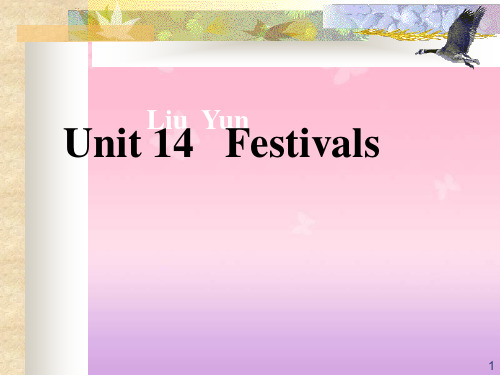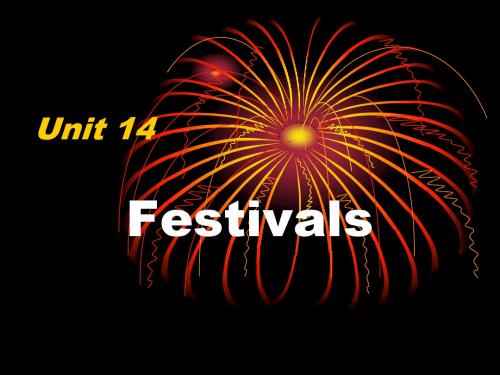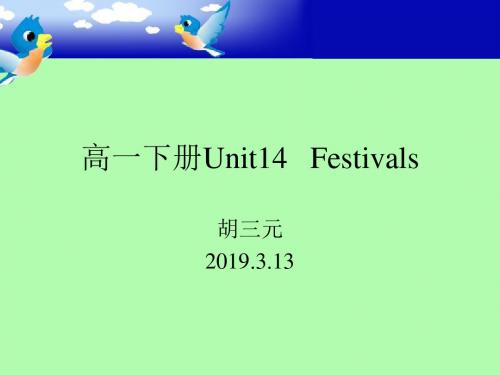英语:高一下Unit14 Festivals全单元课件3(旧人教版)
- 格式:ppt
- 大小:2.00 MB
- 文档页数:2

Reference for Teaching一、异域风情1. Valentine's DayValentine's Day(情人节)is named for Saint Valentine,an early Christian churchman who reportedly helped young lovers.Valentine was killed for his Christian beliefs on February 14 more than 1 700 years ago,but the day that has his name is even earlier than that.More than 2 000 years ago,the ancient Romans celebrated(庆祝)a holiday for lovers.As part of the celebration,girls wrote their names on pieces of paper and put them in a large container.Boys reached into the container and pulled one out.The girl whose name was written on the paper became his lover or sweetheart for a year.Lovers still put their names on pieces of paper and they send each other Valentine's Day cards that tell of their love.Sometimes they also send gifts,like flowers or chocolate candy.Americans usually send these gifts and cards through the mail system.But some use another way to send this message.They have it printed in a newspaper.The cost is usually a few dollars.Some of the messages are simple and short,“Jane,I love you very much.”Others say more.This one,for example,“Don,roses are red.Violets(紫罗兰)are blue.I hope you love me as much as I love you.Forever,Mary.”Most of the newspapers that print such messages are local,but USA Today is sold throughout the United States and 90 other countries as well.This means someone can send a Valentine message to a lover in a far-away city or town almost anywhere in the world.These messages cost 80 dollars and more.An employee(职员)of USA Today says readers can have a small heart or rose printed along with their messages this year.Will this kind of Valentine'sDay message reach the one you love?Well,just make sure he or she reads the newspaper.2. Cluster-of-lights FestivalPeople travel enormous distances just to be home with their families for this happiest and most important of Hindu holidays.And the homes look inviting,too,throughout the late-autumn week of Diwali,especially at night,as celebrants line window sills,porches,and garden walls with long rows of tiny earthenware oil lamps,whose cotton wicks give off a soft,pulsating glow.Diwali is a sort of New Year,at which time people strive to settle old feuds and quarrels and,if they can afford it,buy brand-new clothes in which to celebrate.In the mountain region,bonfires devour the year's accumulation of combustible garbage;in many cities,fireworks dance across the sky.The festivities honor the victory of Rama—an avatar of the love-god Vishnu—over the ten-headed demon who had stolen Rama's wife,Sita.Devotional music and lamp-lighting ceremonies give way to vegetarian feasts,games of chance,and the exchanging of gifts,usually fruits or sweets.Some Hindu temples display towers of pastries fifteen feet high.二、知识归纳1.春节常用表达归纳春节the Spring Festival正月the first month of the lunar year除夕New Year's Eve正月初一the lunar New Year's Day元宵节the Lantern Festival过年celebrate the Spring Festival春联Spring Festival couplets剪纸paper-cuts年画New Year paintings买年货do Spring Festival shopping敬酒propose a toast灯笼lantern烟花fireworks爆竹firecrackers灯谜riddles written on lanterns灯会exhibit of lanterns守岁staying-up拜年pay New Year call;give New Year's greetings;New Year's visit 压岁钱gift money辞旧岁bid farewell to the old year扫房spring cleaning;general house-cleaning年糕Nian-gao;rice cake;New Year's cake团圆饭family reunion dinner年夜饭the dinner on New Year's Eve饺子Jiao-zi;dumpling汤圆Tang-yuan;dumplings made of sweet rice,rolled into balls and stuffed with either sweet or spicy fillings金玉满堂Treasures fill the home.生意兴隆Business flourishes.岁岁平安Peace all year round.恭喜发财Wish you prosperity.和气生财Harmoney brings wealth.心想事成May all your wishes come true.吉祥如意Everything goes well.招财进宝Money and treasures will be plentiful.祝你一帆风顺!Wish you every success!事业成功,家庭美满!Wish you success in your career and happiness of your family!祝你在新的一年里快乐幸福!Wish you happiness and prosperity in the coming year!祝你幸福一年胜似一年!May each year bring you greater happiness!祝你新年快乐,万事如意!Wish you a happy New Year and the best of everything!祝你新年大吉!Wish you good luck in the New Year!祝你在新的一年里百尺竿头,更进一步!Wish you further progress in the New Year!愿数不尽的幸福和成功与岁同增!May each year bring you greater happiness and greater success!2.表示“目的”的方法归纳(1)用“介词或介词短语”来表示目的:A.用介词for表“目的”,因for有“为了”之意。





The Third PeriodTeaching Aims:1.Review the new words appearing in the last two periods.2.Learn to use the modal verbs—must,have to,have got to. Teaching Important Points:1.Learn to guess the missing word according to the given sentence.2.Master the modal verbs correctly.Teaching Difficult Point:How to use“must”,“have to”and“have got to”properly and how to use their negative forms correctly.Teaching Methods:1.Practise and consolidate the words learned in the last two periods.2.Giving examples to explain the difference between “must”and“have to”and the difference between“mustn't”and“don't have to”.3.Making sentences to consolidate the usages of the modal verbs.Teaching Aids:1.a projector2.some slides3.some picturesTeaching Procedures:Step Ⅰ. GreetingsGreet the whole class as usual.Step Ⅱ. RevisionT:In the last class,we read the passage—The birth of a festival.By reading it,we've learnt something about Kwanzaa,such as the birth of it,the purpose of it,the way of celebrating it,and the seven principles of it.Now I want to ask you some questions about it.The first one:Who created this festival?Ss:Dr Maulana Karenga.T:The second one:Is it a young or an old festival?When was it born?Ss:It is a young festival born in 1966.T:When do people celebrate it?Ss:From December 26(one day after Christmas)to January 1(New Year's Day).T:How do people celebrate it?Ss:By lighting a candle each day and discussing one of the seven principles of Kwanzaa.T:Why did Dr Karenga create Kwanzaa?Ss:To celebrate Africa-American culture and history.T:Quite right.In fact we are all creating new festivals every year—festivals and holidays are always changing and as we celebrate them,we make new history and develop our culture.All the holidays and festivals help us understand who we are,remember where we come from and share our hopes for a happy future.Do you think so? Ss:Yes.T:So much for my questions about the passage.Besides,we learned some words in it.Do you still remember the meanings of them?Let's do an exercise on the screen.(Teacher shows the screen.)T:Now please look at the screen.Find the right explanation for each of the words.I read the word,and you find and read aloud the right explanation to it.OK?Ss:OK.T:Nation.Ss:Large community of people;country.T:…Ss:……Suggested answers:1—B 2—C 3—A 4—E 5—F 6—G 7—H 8—DT:Well done.Next,we'll deal with Language study.First,Word study.Then,Grammar.Now open your books at Page….Look at the part—Word study.…Are you ready? Ss.Yes.T:Here is an exercise for you to do.Choose the best word to fill in each blank.Change the form of the word where necessary.Three minutes later,I'll check your answers. Suggested answers:1.theme,faith,purpose2.nations,generation,determination3.joy,ancestors,birth4.trick,peace,treatedStep Ⅳ. GrammarT:We all know that Dr Karenga wrote seven principles of Kwanzaa in the reading material“The birth of a festival”.Can you tell me what they are?Ss:They are unity,self-determination,living together,purpose,working together…T:What does“purpose”mean?Ss:We must remember our past and build our future…. T:How about self-determination?Ss:We have to build our own lives,create for ourselves,and speak for ourselves.T:Quite right.(Teacher writes these sentences on the Bb.)Now,please look at the blackboard.In these two sentences,“must”and“have to”are both used to talk about obligation.But their meanings are not quite the same.“Must”is most often used to talk about an obligation that depends on the person speaking of listening.“Have to”is generally used to talk about obligations that come from “outside”.Let's look at another two sentences and compare them.(Teacher writes the fallowing sentences on the blackboard:1.We must be back by ten.2.We have to be back by ten.)T:Xiao Yu,can you tell the difference in meaning between them?S1:Yes.The first sentence means that we think it is necessary for us to be back by ten.The second one means someone else thinks it necessary for us to be back by ten,or means that there seems to be no other choice. T:(To the whole class.)Do you agree with him?Ss:Yes.T:Then when can we use“have got to”?Ss:In informal English,“have got to”can be used instead of“have to”.T:Can you give an example?Zhao Ning,you try,please.S2:It's getting late,so I'm afraid I've got to go.(Teacher writes it on the Bb.)T:Very good.Thank you.Now,please look at the pictures on the screen and describe what an army man must do or have to do.(Teacher shows the pictures and ask the students to describe each of them one by one.)Suggested answers:1.You have to keep your hair short.2.You must stand to attention.3.You have to keep your boots clean.4.You have to get up early.5.You must keep fit./You must do exercises.6.You must salute your superiors.7.You have to learn to use a rifle./You must learn to shoot.8.You must keep your equipment clean./You have to clean your equipment.T:Well done.You've known the differences between them in meaning.Besides,we should know that“have to”has more tenses than“must”.“Must”can only be used to express present and future obligation;past obligation is usually expressed by using“had to”.For example,when I was your age,I had to get up at 5 every morning.But in reported speech,“must”can be used.Look at this sentence:I told him he must make a decision.Have you understood my explanations?(Teacher writes the examples on the Bb while explaining.)Ss:Yes.T:Very good.Now let's go on with the negative forms of them.Li Hua,can you tell us the negative forms of“must”and“have to”?S3:…(Teacher writes the negative forms on the Bb:must not=mustn't;do not have to=don't have to)T:Do they have the same meaning?Ss:No.They have quite different meanings.T:Well.Let's compare another two sentences.(Bb:You mustn't tell George.You don't have to tell George.)T:Li Hui,would you like to have a try?S4:Yes.The first sentence means“don't tell George”.The second sentence means“you can if you like but it isn't necessary”.T:Quite right.Instead of“don't have to”,needn't is often used in British English,so we also say“You needn't tell George.”It has the same meaning as “You don't have to tell George.”Can you understand?Ss:Yes.We're quite clear about that.T:OK.Next,let's do some exercises.Step Ⅴ. PracticeT:Now,turn to Page 9.Look at the first exercise in Grammar part.Here are some greeting manners in the table.First youhave to decide which are necessary and which are not.Then make sentences using“must”,“have to”or their negative forms after studying the given examples below.A few minutes later,I'll ask some of you to read your sentences to the class.Are you clear?S s:Yes.Suggested answers:1.When you're talking with someone,you must look into his or her eyes.2.If you meet a friend from China,you don't have to kiss him on the cheek or hug him.3.When a soldier meets his officer,he must salute him.4.When you are invited to a formal party,you must wear clean clothes.5.If you want to show your respect to others,you must take off your hat when you greet them.(After that,teacher goes on to deal with the second exercise.)T:Next,let's do the second exercise.Suppose you are spending the Spring Festival at your grandparents' plete the following sentences with“have got to”.First do it by yourself,then exchange your work forcomment and correction with your partner.Suggested answers:1.Your school starts tomorrow,so you have got to say “Good-bye”to your grandparents.2.You broke your grandma's favourite vase,so you have got to make an apology to her.3.Your parents went back to work three days ago,so you have got to stay alone at your grandparents' house.4.Your grandparents have given you quite a lot of money,so you have got to consider how to spend it.5.You have done your homework all wrong,so you have got to do it again.6.You do not know when you should go to school tomorrow,so you have got to make a call to ask your classmate.7.Your grandma was seriously ill,so you have got to send her to hospital.8.You have not bought the ticket to return to your home,so you have got to wait to buy it the next day.Step Ⅵ. Summary and HomeworkT:In this class,we've reviewed the new words we learned.And we've also learnt to use the modal verbs“must”,“have to”and“have got to”.After class,review thecontents in this class,paying special attention to the differences between“must”and“have to”and the differences between“mustn't”and“don't have to”.You'd better do more exercises to learn to use them properly.That's all for today.See you!Ss:See you.Step Ⅶ. The Design of the Writing on the BlackboardStep Ⅷ. Record after Teaching_____________________________________ _____________________________________ _____________________________________ _____________________________________。
Unit 14 FestivalsPeriod 3一、聚焦重点、难点(一)重点A词汇用法salute kiss checkB句型结构Where necessary,……..You must / have to……(二)难点treat二、剖析重点词汇、词组及句型1.Change the form of the word where necessary.在必要处改变单词的形式。
Where necessary=where it is necessary连词+n. / adj. / doing / done等结构,常见的有:if so / not / possible / necessary ;when necessary / possibleI’ll call him if necessary. ( if necessary=if it is necessary)有必要的话我打电话给他。
I don’t know if the meeting will be put off. If so (= If the meeting is put off),I’ll go to Shanghai.我不知道会议是否推迟。
如推迟的话,我去上海了。
Please send him a message if possible (= if it is possible).可能的话给他送个口信。
I don’t know if he will go. If not ( If he doesn’t go), I won’t go either.我不知道他是否去。
如果他不去的话,我也不去了。
2.give away把某物分送给某人 give sth. away to sb.He gave away all his old books to the village children.他把所有的旧书分送给村里的孩子们。
泄露(秘密),出卖(某人)Please give away my secret.别泄露我的秘密。